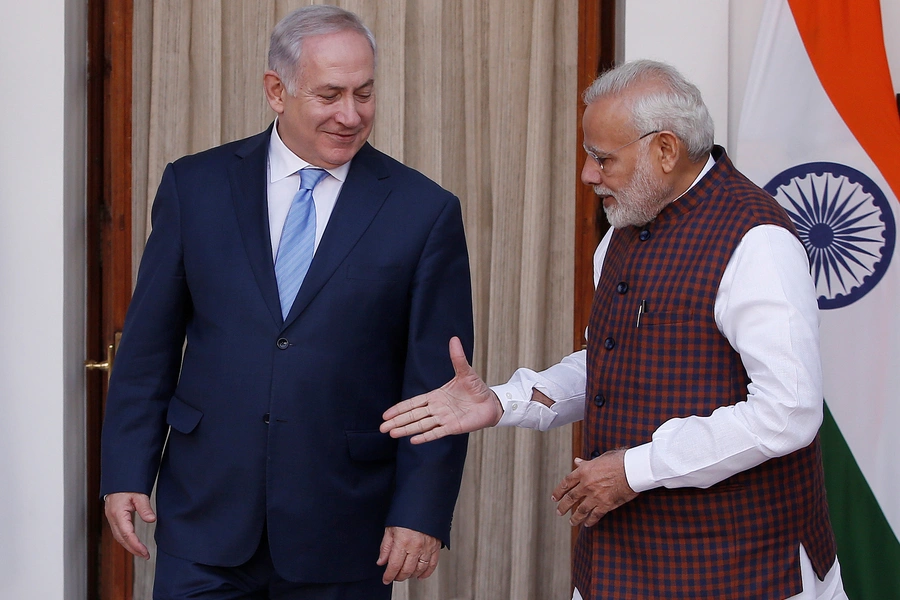Manjari Chatterjee Miller

Indian Prime Minister Narendra Modi extends his hand for a handshake with his Israeli counterpart Benjamin Netanyahu during a meeting in New Delhi.
Indian Prime Minister Narendra Modi’s statement on the Israel-Hamas crisis that unfolded over the weekend was unequivocal. Modi tweeted on X, “deeply shocked by the news of terrorist attacks in Israel. Our thoughts and prayers are with the innocent victims and their families. We stand in solidarity with Israel at this difficult hour.” Indian Foreign Minister S. Jaishankar retweeted the statement. The statement and its speed were striking. Until as recently as 1992, India had no diplomatic relationship with Israel. Furthermore, India is not a country known to be quick to choose sides in a crisis.
Modi’s statement shows how far the India-Israel relationship has come. For many years after India’s independence from the United Kingdom in 1947, Israel was extremely enthusiastic about establishing a close relationship with India. However, for more than four decades, India refused to respond to Israel’s overtures. Jawaharlal Nehru and other Indian anti-colonial leaders, scarred by their experience of Partition and the creation of Pakistan—the first country to be founded on the basis of religious nationalism—were fundamentally opposed to the idea of a state created based on Zionism. Moreover, they were highly sympathetic to the Palestinian cause and saw the plight of the Palestinians as a direct consequence of British imperialism. As a result, while India recognized the establishment of Israel in 1950, it refused to start a formal diplomatic relationship. In the ensuing years, India’s condemnation of Israel continued even though Israel extended India (limited) military support in its wars with Pakistan and China, while the Arab states gave extensive, regular political and military support to Pakistan.
Once formal ties were established in 1992, defense and trade relations took off, and Israel quickly became India’s second-largest defense partner. However, the two nations still did not enjoy a close relationship. Ariel Sharon became the first Israeli prime minister to visit India in 2003, where he was treated to large protests by the Indian public. Furthermore, India regularly voted against Israel in the UN General Assembly.
But after Modi’s election in 2014, the relationship began to take a friendly turn. In 2015 and 2016, India abstained from a UN vote that discussed whether Israel should be brought before the International Criminal Court for its alleged war crimes during the 2014 crisis in Gaza. In 2017, Modi became the first Indian prime minister to ever visit Israel. Today, the relationship spans a broad spectrum, from tourism to defense. Some have even argued that Modi’s Bharatiya Janata Party’s brand of Hindu nationalism and Israeli Prime Minister Benjamin Netanyahu’s right-wing Likud and its alliance with far-right ultranationalists have a common ethnonational, anti-Muslim ideology that has drawn the two countries closer together.
However, even with these developments, Modi’s statement on Israel and how quickly he offered Israel support remain noteworthy. India has excellent relations with Saudi Arabia and the Middle East. Publicly, India still supports the Palestinian cause, hosting Palestinian President Mahmoud Abbas in New Delhi in 2018. But India’s geopolitical situation and domestic politics have changed. Not only does it have a close relationship with Israel, but India is today a close strategic partner of the United States, a staunch Israeli ally. Stability in the Middle East is important to India because, in addition to its relations with Arab nations, large numbers of the Indian diaspora reside and work in the region and send remittances home to family. Furthermore, India, itself extremely vulnerable to attacks by jihadist terrorist groups, understands Israel’s security concerns. Modi’s statement suggests that India has come to see its relationship with Israel as not just friendly, but even vital for its long-term strategic interests.
No comments:
Post a Comment